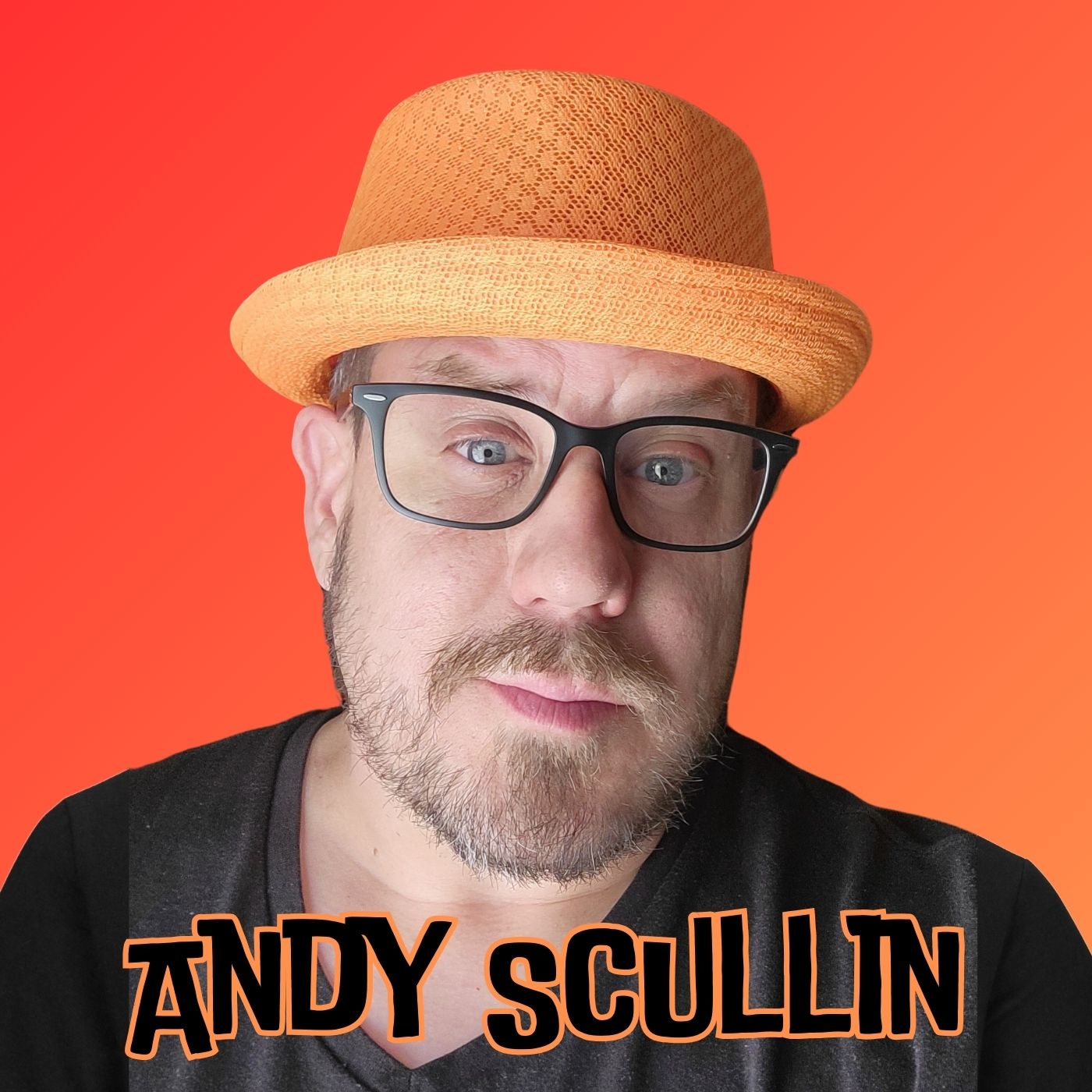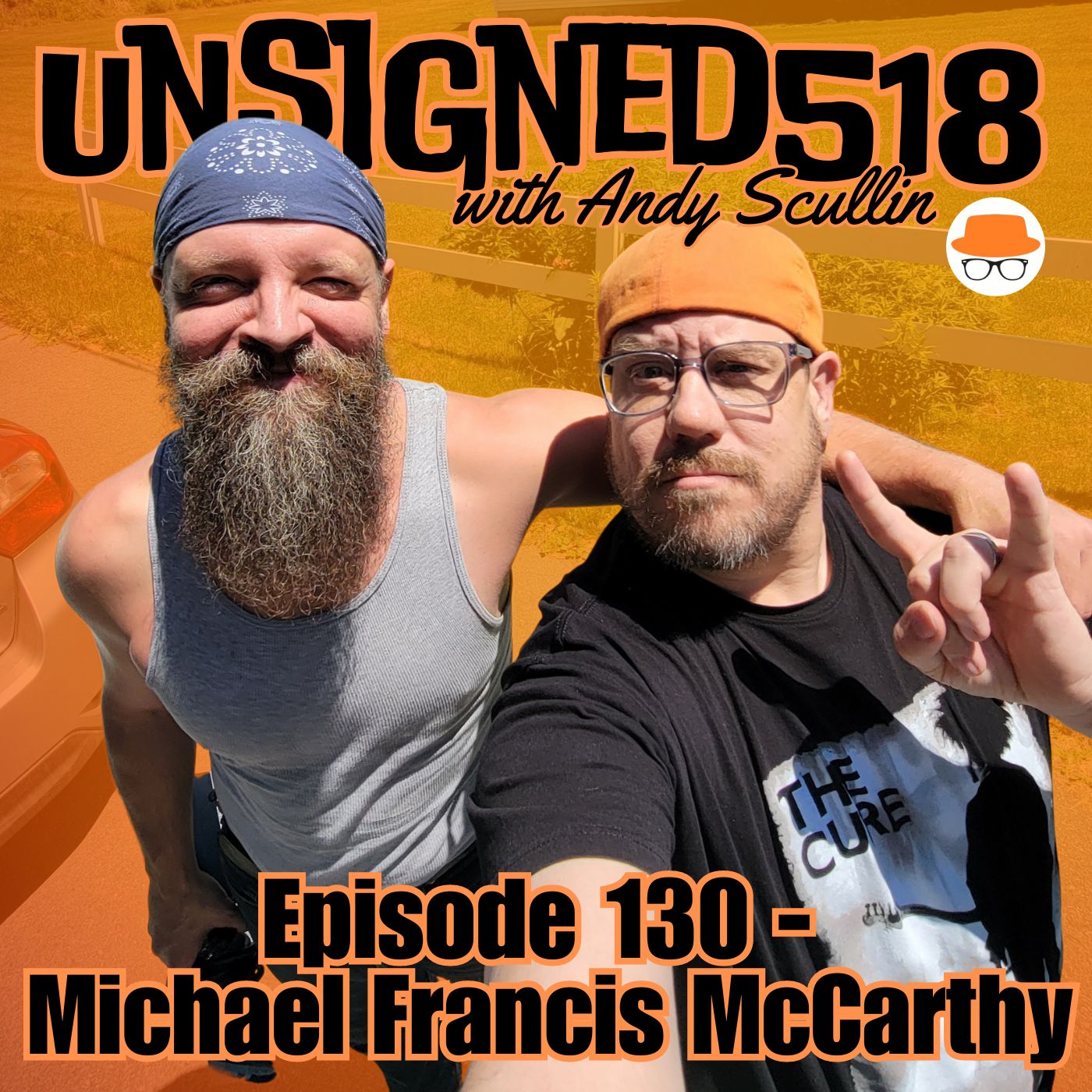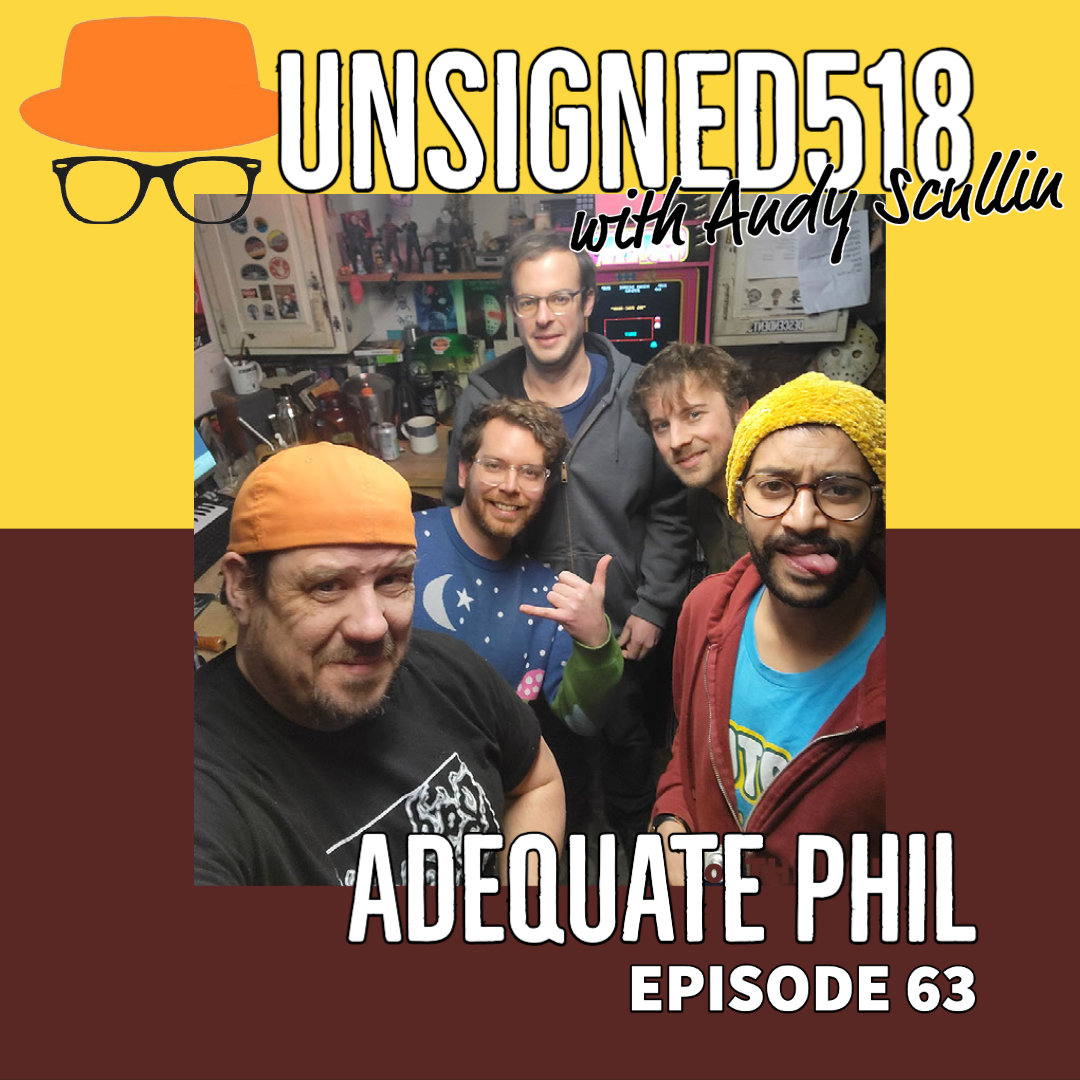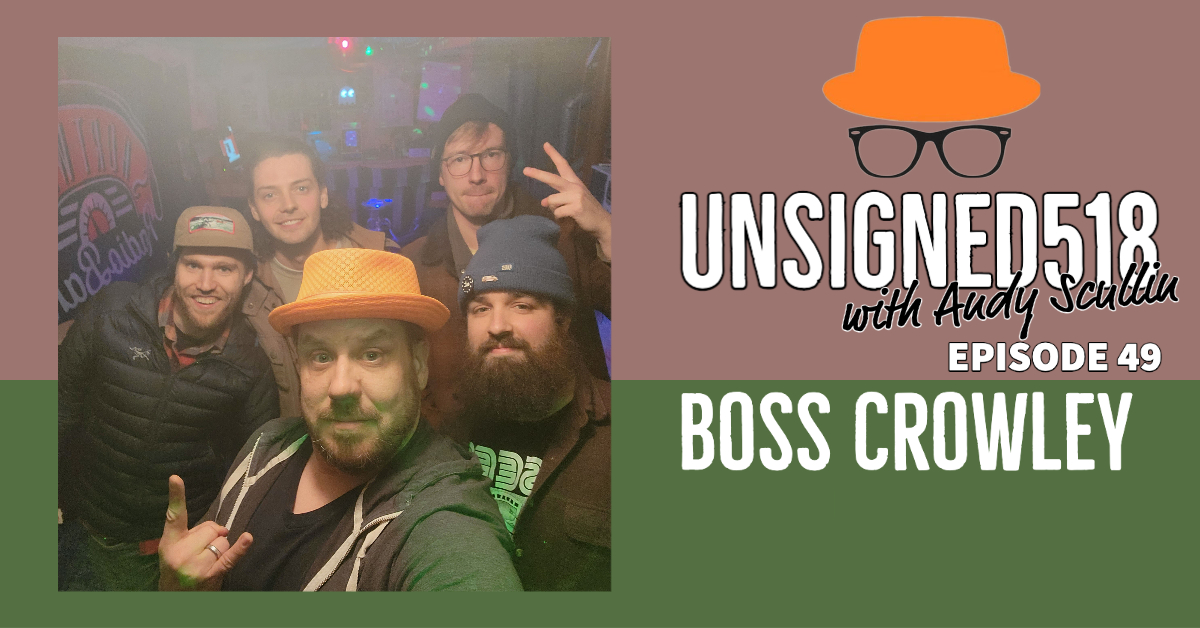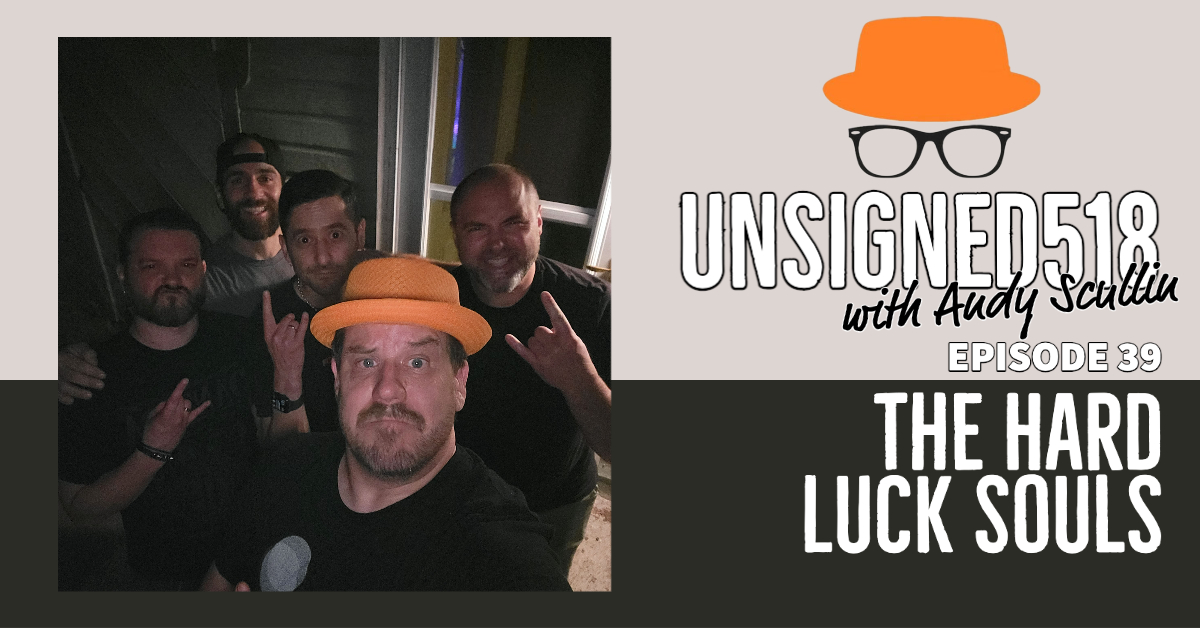[00:00:01] Speaker A: He was born on a Saturday in 73. He loves park rock music. Finding the 13 in the dazzle rock now on the Ben's guitar with a short with radio back his motherfucking Andy scolding. Look at motherfucker cuz here he comes, Andy.
[00:00:27] Speaker B: Welcome to Unsigned 518. I am here with Michael Francis McCarthy. How's it going, man?
[00:00:32] Speaker C: Good, how are you? Good afternoon.
[00:00:34] Speaker B: Yeah, you know, it's going well. We had now, and I can't remember. Cause, like, I always, you know, sometimes shit comes up, like, you know, being DIY musicians or like traveling musicians. There's always. But I feel like we were scheduled and then there was either like a snow. Was it like a snowstorm? I feel like.
[00:00:52] Speaker C: Yeah, I think it was late March and.
And there were like three significant snowstorms this winter. And one of them hit.
[00:00:59] Speaker B: Yeah, the day. The day that you were gonna do.
[00:01:02] Speaker C: It, I think it was like snowed in here.
[00:01:04] Speaker B: Yeah, it was like molt. It was like a foot or more of snow on the. In the springtime or something, if I remember correctly.
[00:01:11] Speaker C: But, yeah, I think you're right. Well, I'm glad we could reschedule it. Andy, thanks for having me in here.
[00:01:14] Speaker B: Yeah, totally. And I'm glad that, you know, we're doing it on such a nice day. And you're actually leaving from here to go to a gig, right?
[00:01:24] Speaker C: Yeah, that's right. I just started working for a hunter mountain brewery. And so, yeah, I'm playing there this afternoon. Three to five.
[00:01:30] Speaker A: Yeah.
[00:01:31] Speaker B: Nice. I love that. So I guess what we want to do is kind of go back and, you know, we were talking a little bit before we got rolling. You know, we want to tell your story, your story, your relationship with music, how it, you know, because to write your own original stuff is there has to be a story to it. You know what I mean? Nobody just all of a sudden wakes up and it's like, oh, I write music now. So I guess in your own words, like, go back as far as you want or as. Or as abbreviated as you want, kind of tell us your story.
[00:02:04] Speaker C: Sure. Well, thanks. Yeah, so, I mean, my earliest music memories, I was born in Columbia and lived in Bolivia till I was almost four years old. And my earliest music memories were of hearing bolivian folklore music from artists like Savia Andina and Luis Rico.
And that stuff really made an impression on me. And, you know, when you're a kid, everything kind of mixes together in your mind. So, like, while my mom was playing bolivian folklore artists, my dad was playing the first Led Zeppelin album, and you kind of can't tell things apart. So it all sort of melded in my mind.
And then I was always into music, always whistling and singing along. And my parents identified that and put a guitar in my hands. When I was like, four, I took lessons with this amazing woman, bluegrass and folk player in rural New Hampshire where I grew up from the age of four onward.
Her name was Elena del Rossi, and I've learned fundamentals from her, from the Hal Leonard guitar method book. I think my first couple songs were like, greensleeves, the irish song.
[00:03:20] Speaker B: I was gonna say, like, michael row your boat to shore or something.
[00:03:23] Speaker C: So you probably know that book.
[00:03:24] Speaker B: I do.
[00:03:25] Speaker C: It's a generational classic, dude. Ode to joy, blues and g, and it's crazy. I went back and looked at that song recently. It was like I was looking at one of my current set lists. I was like, jesus, this is all the stuff I'm still doing.
But it made a big impact and just learning all that first position folk chord stuff really laid a foundation for me. And then, you know, like everybody else in the early to mid nineties, you know, when I was, like, ten years old in 1994, I started stealing my older brother's, you know, Nirvana and offspring, green day, Soundgarden and white zombie. And then somebody else turned me on to Metallica and then from there to Pantera and Slayer. So I ended up coming into this.
I had, like, the bolivian folklore plus the folk, and then got into alternative that put me into metal. And then by the time I was like, ten or eleven, I was really into electric guitar music and all that. And then in high school, my uncle and aunt were like, this kid's gonna need dark side of the moon. And they were right and they gave it to me. I was like, this is weird. What's going on here?
And then I became a teenage stoner and was like, oh, I see what dark side of the moon's about. And then I ended up from there going to Grateful Dead and Allman brothers stuff.
And, you know, I did. I went to college and after college did a couple other lines of work, but was playing gigs. And, you know, I'm 39 now. I've been more or less full time gigging since I was in my, like, late, late twenties, you know, about 1213 years now.
And as far as songwriting, I think it's sort of a. An alchemy of all those. All those things, you know, the bolivian folklore and the metal is always in there, but the main essence of what I'm doing is american roots. Music. I could go on and on about musical influences, but that's the long and short of it. Andy.
[00:05:31] Speaker B: And then, so, you know, you said that you've been touring or touring and, like, doing music for 13 or so years. Like, is that about when you started writing original, or did you start, like, cutting your teeth on those influences? Like, cuz, like, for me, like, I was like, same way. Like, almost every influence that you mentioned I had had some experience with. And when I first started playing guitar, all I wanted to do was be like, oh, let me find that Metallica riff, let me find that Pearl jam riff, and, like, figure it out. And is that kind of the same thing or.
[00:06:05] Speaker C: Yeah, I think in a way those are generational rites of passage, right? To some degree.
You know, it's like you pick up a band for a while and they're your favorite band, obsessed with them. You'd learn what you can from them, and then you move on and maybe you come back again later in life, you know? Like, I had a time of coming back to Nirvana and trying to absorb some more of that, so I. You know, I. And I think with. With everything that's like that. Like the Grateful Dead, I'm once a deadhead, always a deadhead, you know, I learned as much as I could put him down for a while so I wouldn't get sick of it, picked it back up. But to get to your question, you know, and I think this is also kind of a common arc, which is when people grow up with grunge, punk metal, you're, you know, rock, you want to be in a band. And a lot of us, I think, come to solo and acoustic playing maybe a little at another stage in life, although, like, acoustic was always part of what I was doing. But anyway, like, my first gigs were when I was, like, 1920. I played in a metal band.
We were based first in Florida and then in Boston, and we played mainly around Massachusetts. And that was sort of the height of the western mass medal revolution of the early to mid aughts. And so we would play out some of our crazy shows, like Worcester, Chickopee, Springfield area.
But I was pretty focused on metal for a time. And then in, I guess it was like, 2010, I went overseas for a couple years. The band went on hold, and my co founder of the band and best friend contracted leukemia, or, you know, developed leukemia, I guess you'd say, don't really contract it. And he unfortunately passed away. And so when I came back to the States in 2011, I was trying to get my feet under me and we were planning to keep on playing metal, but while I was overseas, I'd been playing acoustic shows to pay my rent and to interact with the community. And the solo acoustic thing was always part of what I was doing, so it became more of like work for money and as a career pursuit around that time it would have been like, yeah, 2010, 2011. And I've kind of just kept on with that and I've continued to do some band work here and there, but my main pursuit has been solo acoustic, electrified, acoustic american roots.
[00:08:34] Speaker B: Right? And it's, I mean, a unique, you know, I've seen your stuff on social, like, it's a unique thing that you got going. And I I. As someone who likes music and likes all kinds of music, I appreciate that, but I also like the carve your own path mentality, you know what I mean? Like the not. And I mean, that's why I'm doing this fucking podcast out of my garage, you know, cuz I'm like, I want to just. I want to do it, so I'm gonna do it.
[00:09:01] Speaker C: Carve your own path.
[00:09:02] Speaker B: You're like, I'm gonna do it, I'm gonna do it. And I love that, you know, you brought not just an acoustic guitar, but you brought your amps. And when you were coming in, you were like, part of my thing is like, I use my mic stand as a bass drum and I was like, I'm not, you know, it was like, huh? You know. So you've got your own thing and it's interesting and I am stoked to have you do a performance in here. So what's the first song that you're going to do in here?
[00:09:34] Speaker C: So I'm gonna play a tune that came out off my last album, check engine. And this song's called northern Roots.
[00:09:40] Speaker B: Northern Roots. And what we're gonna do also for those listening is I'm gonna video this and put it up on YouTube so you can check out Michael Francis McCarthy on YouTube doing northern roots. And we're gonna get started right now. So let's hear northern roots, Michael Francis McCarthy. And then we'll be right back.
[00:10:21] Speaker A: Traveling the north way along upon the ridge sighted by the falcon roost upon the bridge tumbling benz are thundering far off in the hills something strange going on deep in them cats hills it's a yankee kind of thing.
I don't try to sound like I'm from Texas when I sing. I don't own a stetson or bear a cowboy boots cause I come from northern roots summer's only fleeting and soon it will be past?
I don't trust the sunshine cause I know it never lasts?
I don't like to talk when I don't have much to say? Winter is approaching there's work to do today it's a Yankee kind of thing?
We never had plantations and never bowed to kings?
Founders of the nation wearing wool and steel toe boots? Well, we come from northern roots?
Factories and farmland lumber, coal and steel?
From brickyard to boatyard we keep an even keel?
When you have no slave you must labor on your own? The truth is cold and hard when you're made of stone?
It's a Yankee kind of thing?
We don't need a bible belt to hold up our blue jeans shirt collar tarnished with oil, soil and soot? We come from northern roots?
We come from northern roots.
[00:13:51] Speaker B: All right, that was northern roots. Michael Francis McCarthy here live in the dazzle den. And again, if you're listening, you can go to. Go to my YouTube channel and check out the video of that. So, Michael, we were saying before we got rolling, you travel all over the place and have gigs. I mean, literally, like, philly up to super far north, like, Massachusetts all over the place. And where are you, like, actually central to? I guess so.
[00:14:26] Speaker C: I mean, I've lived in a couple areas of the Hudson Valley and capital region since I've been living in New York, like, these last six, almost seven years.
But for really, to me, like, my home base is Albany. I play, like, a three or four hour radius around here. So I go out to the finger lakes, like, north to Lake Placid, like, east out into Massachusetts and south as far as, like, Philadelphia, sometimes down to Virginia. But really, to me, like, my home base, where my fan base is, is Albany region. And I also consider that to really be, like, the heart of, in some ways, the northeast music scene. But, like, I think increasingly, the 518 area code is where it's at for music culture in New York.
[00:15:16] Speaker B: Yeah. And I think it's because, like, it's. I don't want to say, like, friendly, like, you know, everything's just, like, cheery and whatever, but, like, this music scene compared to, like, some of the bigger markets that are close by, like, you know, New York City, Boston, Philadelphia, like, it seems to be more connected here. You know what I mean? Whereas it's not like. And I sometimes am speaking just from looking at, like, bigger markets. Like, when I was in radio, I didn't pay as much attention to local. It was always bigger, and it was always competition, and it was always like, but you'd have bands in the same city that don't even know who the other band is simply because they weren't the same genre, you know, whereas, like, here, everybody knows everybody, and I think that is what makes it unique here, is that it's. I don't know, it's like a melting pot of genres, getting along and hanging out together.
[00:16:16] Speaker C: Yeah, I think that's true. I think there's a cohesiveness to the Albany area music scene and part of it, and I've seen this in different parts of the country because I've lived in a couple parts of the country, and I was based in Florida. I'm based in Texas at one point. But one thing I've seen is some of the more competitive markets. They're competitive because of how big they are, which also ends up playing into the cost of living. So you end up having people who.
A lot of musicians get forced out of these markets as they become bigger and hotter, and it causes sort of economic dislocation, it causes housing issues.
It drives down the price of labor. But what you see in 518 is, like, look, everything's getting expensive, right? But, like, people who live in New York are, like, paying, like, $3,000 rent, living in a shoebox, and doing something else, like, 60 hours a week. And they play gigs when they can. But, like, up here in the 518, like, people live here and gig here. And because of how it's positioned as an intersection point between major highways, it's a great, like, stopping for touring. It sends you to points north, south, east, and west. So I. Yeah, it's. It's. It's. There's a working class element that makes it so that people can live where they play. And so it's a great place to meet other musicians and to find community.
[00:17:41] Speaker B: And one thing I found, too, is, like, bands coming through, like, you know, and some of the venues, like, that would have, like, touring acts that, you know, are making a one night stop on a bigger tour or whatever, is a lot of the times they'll look for local acts as support, you know what I mean? And you'll be like, oh, shit, look at that. That local band that, like that. I know, you know, we're opening for this national touring act, like, you know, empire live or whatever.
[00:18:11] Speaker C: Well, what I look for in a healthy music scene is I want to see sort of, like, a complete ecosystem where there. There are rooms for national acts, right? There are rooms for local acts across numerous genres. And also that it's located strategically in an area that people like to tour through. So, like, there are some places, like, for example, I used to live in Pensacola, Florida, where it was like, Pensacola is tiny, but because it's on I ten and it's a key stopping point between New Orleans and Jacksonville, all the legends would be passing through. They'd want to stop there.
But likewise, I find with this area, it's just what you're saying that, like, because of its geographical location and because there's this critical mass of people who live and play here, it just invites national acts to come through. And so there's an on ramp to success out of the Albany area.
[00:19:00] Speaker B: Yeah. Fuck yeah. I love that. I love that view on it, you know, because some people shit on, like, I've seen it on social, like, people shitting on the scene and it's like, open your eyes back. It's like, look, it's happened. It's.
[00:19:12] Speaker C: Take your peg. If you want to go, you know, if you want to go live in a suburb of New Jersey, if you want to go to New York or LA, go ahead. We'll see you in two years with your tails between your legs.
[00:19:24] Speaker B: Yeah, I moved out to LA, like, probably 25 years ago, and it was like, yeah, this is gonna be awesome. And I got out there, I was.
[00:19:32] Speaker C: Like, oh, my God, I am so lonely. And I work as a dishwasher. Totally.
[00:19:37] Speaker B: I'm like, this so bad. I lasted, I think, like 14 months or 15 months, something like that before I came back.
[00:19:45] Speaker C: With a hole in your soul and a desire to see your friends and.
[00:19:47] Speaker B: Just being like, because I lived in Vermont at the time and just being like, oh, my God, I love Vermont. Like, I love this part of the country because, like, seeing, you know, like, being like, oh, hollywood, that's going to be so cool to be like, hey, you want to go out tonight? And it means going down to Hollywood and then going down there and seeing people shooting heroin on the sidewalk and, like, junkies passed out asleep on, like, someone's celebrity. Celebrity walk or, you know, the star, the walk of fame there. You'd literally be like, that dude is shooting heroin on.
[00:20:19] Speaker C: You know, I think it's part of the musicians Odyssey, which is when you're young, you're like, man, I can't do anything in this town. I gotta go. So, like, you know, I spent some time in New Orleans. I spent some time in Austin. Now, both of those places have brilliant musicians, great places to go to shows, great place to have on your business card, horrible places to work, right? Horrible places to pay rent. And, like, you know, you go to New Orleans and you're hoping to find this, like, you know, american roots music dream, and it's there, but you got to look for it, and you got to look past the guy passed out in the gutter, fentanyl, which is. And he's everywhere. And it's a tragedy. But just like with Austin. Like Austin, great music town in a lot of ways. Terrible town for work, in price of labor, super driven down price of rent through the roof, you know?
[00:21:15] Speaker B: So, yeah, I love it here. Again, I don't have, you know, I don't ever have any aspirations to be outside of here because to me, everything that I need is right here. You know what I mean? And literally, I mean, like, on this half acre of land, pretty much like, everything I need is right here. And I can drive. You know, I'm close to Saratoga. I'm close to Albany. I'm close to Glens Falls and whatever, you know?
[00:21:38] Speaker C: And if you want to go see under. Under underground, like, hardcore metal, I can see that boom.
[00:21:42] Speaker B: Go to the. If I want to go see stadium.
[00:21:44] Speaker C: Shows, go to Albany.
[00:21:45] Speaker B: Absolutely. And, I mean, even Glens falls has, you know, the civic center there has some big national acts, and, I mean, that's 18 minutes from where we're sitting right now. You know, like, it's a. There's shit happening here all the time.
[00:21:59] Speaker C: You know, an idea that took me a long time to come to understand, and part of it is, I had to discover it empirically. And part of it was advised to me by people along the way, career wise, which is like, you find a market and you develop your loyalty to that market and grow within it. And then the goal is to move laterally from that market to others. So it's like, Albany gives you a path to grow your career, and then, like you say, if you meet other bands who are on a touring circuit and plugged into a bigger picture national music scene, you know, the path to that isn't go to New Orleans, go to Austin, go to New York, go to LA. The path is grow, right? Put your head up above the surface in the 518 and then develop those contacts. I mean, if you're from LA, you know, or, like. I mean, maybe it was different before the Internet, right? When, like, Sunset Strip was the place to go and, like, have big hair and do glam metal and, like, make it a thing in 1987, like, go ahead and do that, because then you're part of that localized community as it's growing and thriving. But you know, or if you like, you know, if you have, if you grew up in New Orleans and you're part of like the loyalty, you know, that. Excuse me, royalty of like Cajun derived, like, you know, that's a whole thing. But again, that's about the local community. So I think sometimes when us small town musicians from the northeast were like, oh, I think the thing I have to do is leave where I'm from and find the coolness in some city somewhere.
[00:23:27] Speaker B: And it's not. Definitely not. All right, well, cool. Do you want to play another song for the folks?
[00:23:34] Speaker C: I do, yeah. And this next tune I'm gonna play is called better than your phone. And by the way, it's father's day today, so. All right, this one's for my kid. Better than your phone.
[00:23:44] Speaker B: Fantastic. Well, let's listen to better than your phone, Michael Francis McCarthy, and again, go over to my YouTube channel, just unsigned 518, and catch the video of it. So here's better than your phone and then we'll be right back to wrap it up.
[00:24:24] Speaker A: Late summer or summer I'm all alone when to walk and talk and do things on my own papa, ain't I better than your phone?
After work is done when bills get paid you only get so many carefree days I don't wanna scroll all the way let me see your eyes can you see mine?
I been waiting for a moment of your time guess I got to just talk to you online.
You know, there was nothing like a smile from a toll booth operator when you were keeping in the lines trying to take your sweet time home.
Late summer or sunlight I'm all alone learn to walk and talk and do things on my own baby, ain't I better than your phone?
[00:27:32] Speaker B: Alright, that was better than your phone. Michael Francis McCarthy live here in the dazzle den. So Michael, I want to thank you so much for taking time out of your day, especially on a father's day and a busy day. You have a gig to go to right directly from here. So I really appreciate it, you know, and before we go, just like all my guests, I want to give you a chance to say what I refer to as your gratitude. So microphone is all yours.
[00:27:57] Speaker C: All right, well, first, as far as gratitude, let me just thank you, Andy, because I have to tell you, there were probably like five different people who in talking about members of the 518 music community that I should get to know numerous people like, you know who you should do? Go talk to Andy and go on unsigned 518. So let me start with saying to you specifically. Thanks for doing the show, not just for me, but for this scene. It's, your reputation precedes you and is strong.
[00:28:26] Speaker B: That's awesome. Thank you.
[00:28:27] Speaker C: So thank you. And so, you know, to, to zoom out from that a little bit, my biggest gratitude is for the people in the 518 Albany capital region and Catskills region. People who are givers in the world of music who are working to contribute to the scene, people who go to everybody else's shows, cover other people's shows. So that includes you. That includes Ralph Rena, my good buddy Matty D.
These are people who are lovers of the music scene or, you know, people like, you know, Greg Bell at Guthrie Bell. He's the work he's put in to lift up bands and make good shows, fill rooms with music. People like that are who I'm grateful for. And then just as far as in my personal life, I mean, like, Ralph is a buddy of mine, I'm really grateful to the fans in this, and this is cliche, but fans in this region who have been coming out to my shows, you know, this is place I play out in Nassau SNL Farm brewery. And that crowd has been growing with me over these last six years. So I'm just really grateful to the fans in the capital region. And beyond that, grateful to my family. What else can I say?
[00:29:44] Speaker A: Grateful to go.
[00:29:46] Speaker B: All right, so he is Michael Francis McCarthy. I am Andy Scullen. This is unsigned 518, and I'll see you on the road.
Unsigned 518 is produced and hosted by me, Andy Scullen. New episodes are available every week wherever you stream podcasts. If you'd like to help support the show, please like and subscribe wherever you are listening. Or you could buy me a
[email protected]. unsigned 518 if you would like to advertise on the show, send me an email at unsigned 518 mail.com. and to be a guest on the show, reach out to me through Instagram at unsigned five one eight.
Take care of one another, and I'll see you next week.
